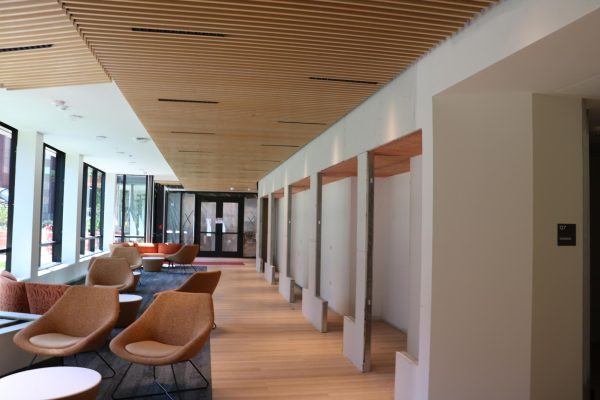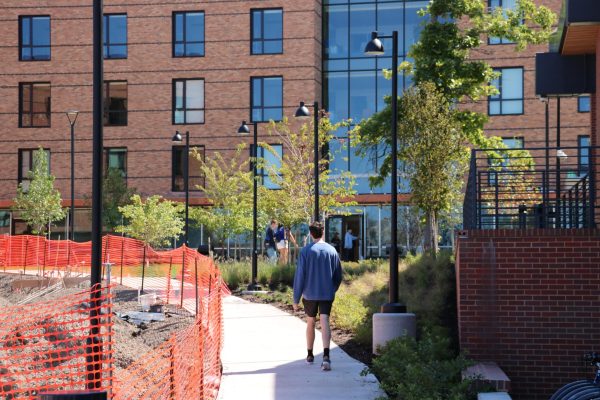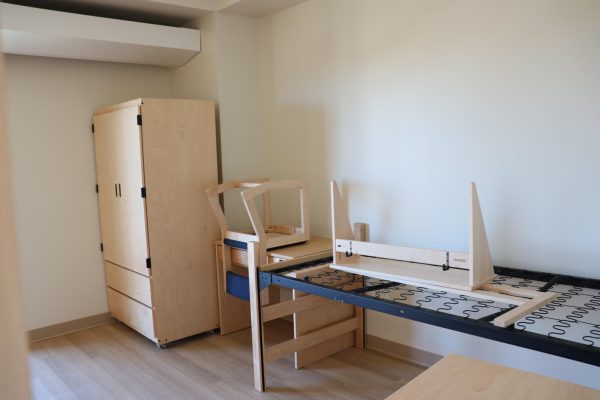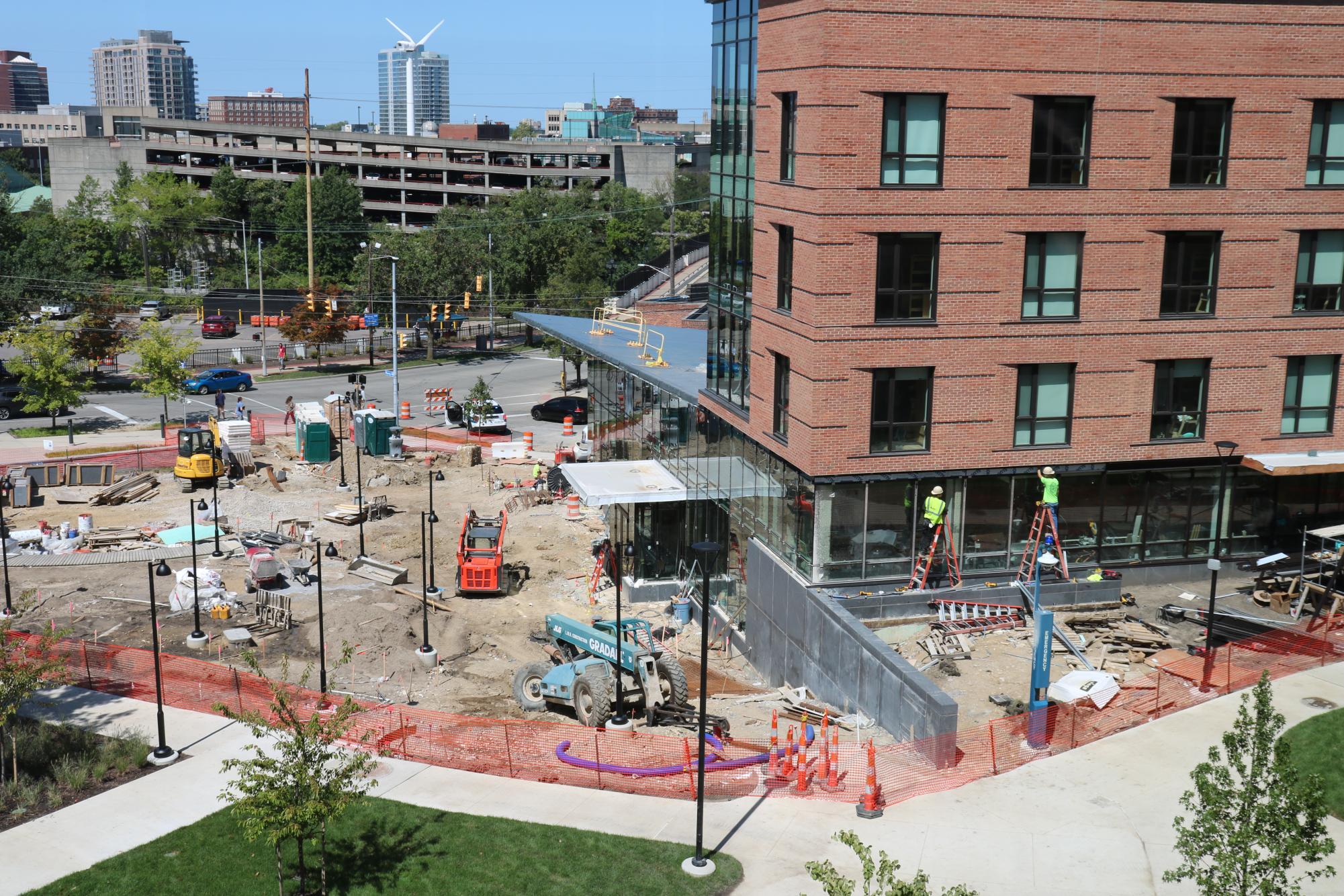On Aug. 21-25, second-year students could officially move into their housing assignments in the newly constructed Mary Chilton Noyes and John Sykes Fayette Houses in the South Residential Village. While students’ rooms are complete, both Noyes and Fayette’s exteriors and common spaces are still under construction through September, according to an email from the Office of University Housing.
“The residential areas will be over 90% complete, with minor finishing touches remaining,” Vern Rogers, executive director of University Housing, said regarding the buildings’ statuses. “The multipurpose room, health clinic and staff offices will open shortly after.”
Each room has an HVAC cooling system and in-room thermostat along with a bed, desk, chair, drawers and a wardrobe from New England Woodcraft. Each floor features a laundry room with three washers and dryers, study rooms and a kitchen. The majority of Noyes and Fayette rooms are doubles that share bathrooms with their floors. Differing from that of first-year housing, each bathroom contains a toilet and a shower with the sink outside. Floors are co-ed, and bathrooms do not have gender specifications.
Fayette resident Courtenay McCartan feels the bathroom layout is not the most efficient.
“Someone’s always showering. The floor is just always wet, but it’s okay and otherwise it’s really nice,” she said. “You can tell the appliances are new, you can tell the furniture is new.”
Juliana Garza, a Fayette resident, highlighted the benefit of having air conditioning but felt there’s less privacy in Fayette compared to first-year housing.
“I definitely enjoy that there’s air conditioning this year. That’s a huge plus, but it feels much less private than it did last year,” Garza said. “There’s just windows everywhere. I feel like everyone can see everything, especially like the bathrooms don’t have any sort of door, and they’re all co-ed.”
Elizabeth Odife, a Fayette resident, also mentioned her frustration over the bathroom setup. 
“I feel like [the university] rushed these buildings so much that now, unfortunately, their priorities are all over the place,” she said. “My biggest complaint, honestly, is the communal bathrooms. Because while I’m fine with co-ed, I get jump-scared seeing a man there, no offense. My biggest issue is the fact that there’s like an inch of space between the curtain and the floor, so that leads to water going everywhere.”
Some students, including McCartan and Odife, had single rooms as first-years and now have a roommate.
Noyes resident Srinithi Chandrasekaran also echoed the lack of privacy but highlighted the full kitchens on each floor.
She said, “This kitchen is really nice. We used it the other day, and it was so nice to cook and have an actual home-cooked meal.”
While Noyes and Fayette have been in consideration since 2015, construction began in July 2021, with the halls expected to open by August 2024. In total, the halls will provide 600 additional beds to accommodate Case Western Reserve University’s rising enrollment rates.
Some students who were participating in summer transition housing were living in Fayette prior to the university’s Aug. 17-20 early arrival dates. Students with summer transition housing and a fall assignment in Noyes were assigned a temporary space in Fayette due to a delay in receiving Noyes’ temporary occupancy permit. All residents were able to move into both Noyes and Fayette in time for the start of fall semester.
Makaila Burnham, a Noyes resident, said she moved into Fayette as part of summer transition housing.
“[The university wasn’t] very clear because I wasn’t sure how long I was staying in Fayette,” she said. “Now my room is right over the construction, so I hear that all the time in the mornings, so that it’s a little bit frustrating, but, I mean, they send out some updates through emails, but I think they could do more and be more communicative with us.”
While not participating in summer transition housing, Fayette resident Angelica Reyes heard about Noyes residents living in Fayette during the transition period, which raised some concerns.
“I think it was just like, really unsure whether [the buildings] were actually going to open on time because I had friends here early, and they were telling me one of the buildings isn’t even accessible yet,” Reyes said. “Then I was like, ‘well, if they need to stay for longer, then where do we go if we are in Fayette.’”
University Housing is now sending Noyes and Fayette residents a weekly email with details about the ongoing construction.
Construction workers are scheduled to be on-site from 9 a.m. to 4 p.m. until construction is completed. The area between Fribley Commons, Noyes’ multipurpose room and Murray Hill Road will be closed until the health clinic and multipurpose room are completed.
“I guess I didn’t fully expect them to be ready on time,” Garza said. “I’m glad they at least got all the bedrooms and the bathrooms ready on time, but yeah, just it didn’t feel like we were getting like that many updates, so it was concerning for a while. But I guess it’s worked out for the most part.”
While these are the most significant aspects of the current construction, canopy roof installation, bike room finishing and other exterior projects will be happening the week of Aug. 26, according to the weekly Noyes and Fayette resident email. Starting Aug. 27, contractors and a member of the University Housing staff will be installing permanent window shades in some students’ rooms, starting with Fayette’s sixth floor and working top to bottom through both houses.
Even with the continuing construction in select areas of SRV, Rogers highlighted the university and University Housing’s excitement about opening the new resident halls.
“We believe students will love the new buildings and features,” Rogers said. “As with any new building, there might be a few surprises, but our teams will be ready to address any issues.”



